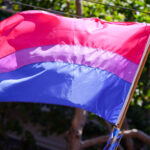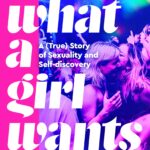It seems that whenever a famous queer woman starts dating a man, she is hit with a wave of backlash. And today, on International Bi Visibility Day, it feels important to ask: why does this keep happening?
The obvious answer would be playing old biphobia. And yes, that plays a huge part; however, the truth is far more complicated. Together, we’ll have a look at how parasocial relationships, queerbating accusations, and misogyny affect this phenomenon, and we will try to make sense of it together.
Parasocial relationships and unrealistic expectations
If you spend any time online, you’ve probably come across the term parasocial relationship, coined in 1956 by Horton and Wohl.
According to Oxford reference, the term refers to a kind of psychological relationship experienced by members of an audience in their mediated encounters with certain performers in the mass media, particularly on television.
It describes the one-sided bond people feel with public figures. In practice, it means fans often believe they “know” these figures intimately, projecting expectations onto them and demanding certain behaviours.
Article continues below.
Back in Hollywood’s Golden Age, stars were carefully packaged by studios. Today, however, the rise of social media has made celebrities appear even closer, more “real,” and accessible. Some actors, singers, and comedians even post directly to fans, without the use of PR teams. This furthers the illusion that we know them personally.
Queer female celebrities are not exempt from this phenomenon. Fans construct these ideas about queerness, what a queer woman should be like, who she should date and how she should act. When she does not meet those expectations, she faces backlash.
But really, queer celebrities, especially women, did not ask to be role models for queerness, and expecting them to act a certain way or to embody the image that you have created of their identity is unfair, and it’s harmful.
To Queerbait or not to Queerbait?
What is queerbating? The term has been thrown around so haphazardly on the internet that it seems to have lost its meaning.
According to the Oxford Dictionary, queerbating is “The practice of incorporating apparently or potentially LGBTQ characters or relationships into a film, television show, etc., as a means of attracting or appealing to LGBTQ audiences, while remaining deliberately coy or ambiguous about the characters’ sexuality; (more generally) the practice of trying to appeal to and capitalize on LGBTQ audiences or customers in a deceptive or superficial manner.”
However, the term has been distorted and misused so often on the internet that it has been weaponised against people, especially celebrities.
One of many examples is Heartstopper’s actor, Kit Connor. Kit faced countless accusations of queerbaiting after starring in the popular show. Online harassment forced him to come out as bisexual before he was ready.
Even though male celebrities have faced accusations of queerbaiting, it seems that female celebrities, even those who are publicly out and queer, are facing far more violent and persistent accusations. Suddenly, dating a man becomes proof of betrayal, deception and exploitation.
Examples of Queer Women Accused of Queerbaiting
Billie Eilish
After her Lost Cause music video, which depicted a slumber party between women, with very sapphic undertones. She was immediately accused of queerbaiting. Eilish doubled down when she posted the video on Instagram with the caption ¨I love girls¨. She later came out as bisexual.
When she was recently photographed with a boyfriend, she was accused of “betraying” the community, some even calling her as a lesbian who had “gone straight.” It is important to remember that Eilish never once claimed to be a lesbian.
Cardi B
After the music video Wild Side with Normani, some people accused the rapper of queerbaiting. One user called her a celebrity, “that came out as bisexual but never dated someone of the same gender.” Cardi clapped back on Twitter (now X) saying:”I ate b*tches out before you was born”
Cardi B added that she had been open about her bisexuality and that the accusations felt like an erasure of what bisexuality means.
Madison Bailey
Despite being openly pansexual, The Outer Banks actress has faced accusations of queerbaiting for how she presents herself and her relationships online. This proves that even explicit openness doesn’t protect queer women from harassment.
Ariana Grande, Rita Oran, Halsey, and many other female celebrities who do not identify as straight have faced similar backlash.
When Biphobia Meets Misogyny
Biphobia is defined as the rejection or erasure of bisexuality, often rooted in the belief that monosexuality (being attracted to only one gender) is more “valid.” And it doesn’t just come from outside the LGBTQ+ community; queer people themselves can perpetuate it.
Bisexual men also experience biphobia, but the form it takes for women is particular. For queer women, biphobia is linked with misogyny, and for bisexual women of colour, with racism. Their queerness is constantly doubted, sexualized, or erased, especially when they’re in relationships with men.
Being a queer woman does not mean you can’t date men. Dating a man does not make you “less queer.” And not all queer women who date men are bisexual; queerness is diverse, fluid, and personal.
According to BiResource.org, bi+ people often face criticism from both straight and queer communities. Bi+ women, in particular, are accused of “performing” for male attention, a stereotype which stems from pornography and popular culture. These inaccurate ideas diminish bisexuality and reinforce patriarchal standards.
According to the Centres for Disease Control and Prevention in the United States, bisexual women experience higher rates of sexual violence than both lesbians and straight women. The Trevor Project also found that they are more likely to face anxiety, depression, and suicidal thoughts.
The Need to Decenter Men
In today’s feminist and queer spaces, there’s a call to decenter men, to refuse the idea that men should be at the centre of women’s lives, their desires, or their politics. It’s a necessary and powerful change.
However, this should not be used as a way to invalidate Bi+ women’s queerness. These baseless accusations seem like a step back, a contradiction. Asking women to decenter men should mean freeing all women, not punishing bisexual women for who they are. To tell a bisexual woman that she stops being queer the moment she dates a man is to reinforce the patriarchal system we aim to dismantle; it is dismissive and harmful.
When queer women are discredited or vilified for dating men, it doesn’t just hurt them; it also erases the massive contributions of bi+ women to queer history and activism. Bi+ women have an important legacy within the movement and have been extremely influential in the fight for LGBTQ+ rights.
Marsha P. Johnson was a self-identified bisexual trans woman and was central to the Stonewall uprising. Brenda Howard, a feminist and bisexual woman, was one of the main organisers of the first Pride March in New York City, and she helped popularise the term “Pride”.
On this Bi Visibility Day, let’s remind ourselves: there is no place for misogyny, racism, or biphobia within our community. If we want to challenge heteronormativity and dismantle violence against queer people, we must include bi and pan voices.
Sexuality is fluid. People grow, change, and evolve. Celebrities are navigating the same complicated process of self-discovery as the rest of us.
So the next time the internet loses its sh*t over a queer woman dating a man, try to remind them that Bi and Pan people exist.
Want to learn about bisexual history ? Here is our article about the bisexual Flag, its meaning, history, and Importance to our community.
Happy Bi Visibility Day!
Nonchalant xx







